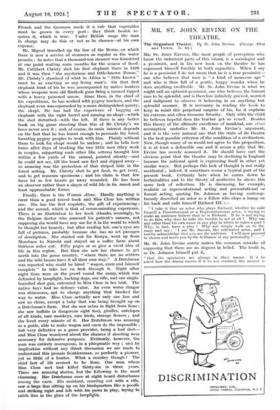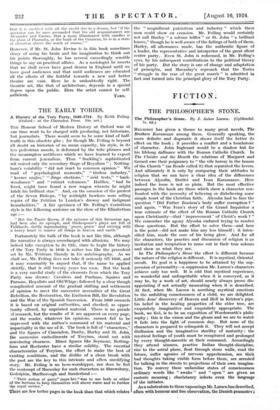MR. ST. JOHN ERVINE ON THE THEATRE.
MR. Sr. JOHN ERVINE, like most people of perception who know the industrial parts of this island, is a sociologist and a pessimist, and in his new book on the theatre he has expressed himself forcibly in both capacities. When I say he is a pessimist I do not mean that he is a true pessimist— one who believes that man is "a kind of nauseous ape" and who is thus full of a gentle, happy wonder when he does anything creditable. Mr. St. John 'Ervine is what we might call an optimist-pessimist, one who believes the human race to be splendid, and is therefore infinitely grieved, worried and indignant to observe it behaving in an anything but splendid manner. It is necessary in reading the book to keep in mind this perpetual surprise of his, for it explains his extreme and often tiresome ferocity. Only with the child be believes hopeful does the teacher get so vexed. Besides this theory of the ultimate excellence of mankind, one other assumption underlies Mr. St. John Ervine's argument, and it is the very natural one that the state of its theatre is the best possible criterion of the condition of a civilization. Now, though many of us would not agree to this proposition, it is at least a defensible one and it seems a pity that Mr. Ervine has merely assumed it. He should have met the obvious point that the theatre may be declining in England because the national spirit is expressing itself in other yet similar ways. But perhaps this lack of thought is not really accidental ; indeed, it sometimes seems a typical part of the present book. Certainly here when he comes down to technicalities and to the theory of aesthetics he shows this same lack of reflection. He is discussing, for example, realistic or representational acting and presentational or formal acting, quoting Dr. Johnson as having contemp- tuously described an actor as a fellow who claps a hump on his back and calls himself Richard III. :— "I take it that an actor who plays Richard, whether he calls himself a Presentational or a Representational actor, is trying to make an audience believe that ho is Richard. If he is not trying to do this, why does he take the trouble to act at all ? Why use any other than his own name in any play in which he takes a part ? Why, in fact, have a play ? Why not simply walk on to the stage and say : • I am Mr. Snooks, the celebrated actor, and I hereby acknowledge that you are the audience. I will now proceed to charm and move you by the brilliance of my personality' . . ."
Mr. St. John Ervine surely makes the common mistake of supposing that there are no degrees in belief. The truth is, as Dr. Johnson himself put it,
"that the spectators are always in their senses. If it be asked how the drama moves if it be not credited, the answer is
that it is credited with all the credit due to a drama, but if the spectator can be once persuaded that his old acquaintances are Alexander and Caesar, that a room illuminated with candles is the plain of Pharsalia, or the bank of the Granicus, he is in a state of elevation above the reach of reason.'"
However, if Mr. St. John Ervine is in this book sometimes chary of using his brain and his imagination to think out his points thoroughly, he has several exceedingly sensible things to say on practical affairs. As a sociologist he asserts that we shall never have good drama in England until we have good audiences and that until audiences are educated all the efforts of the faithful towards a new and better "theatre are vain. Here he is undoubtedly right. The theatric art, like that of architecture, depends in a special 'degree upon the public. Here the artist cannot be self-



































 Previous page
Previous page